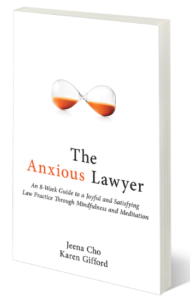Now that we are in the reading period at BLS (aka Hell Week at some institutions) and exams are just around the corner, stress levels are running high. Throughout the library, anxious faces are buried in casebooks and class notes, an ample caffeine supply on hand to fuel the late night cram sessions. Sadly, the stress doesn’t end upon graduation. Being a lawyer requires you to deal with conflict, unreasonable client demands, tight deadlines, and long hours. These can be especially unforgiving for someone newly entering the profession, and can lead to unhealthy habits — there’s a reason why some state bar associations require members to take continuing legal education classes on substance abuse.
So what is a stressed out law student or lawyer to do?
 The answer, according to Jeena Cho and Karen Gifford, is mindfulness and meditation. In their book, The Anxious Lawyer: An 8-week Guide to Joyful and Satisfying Law Practice Through Mindfulness and Meditation (2016) [Call number: KF298.C47 2016], lawyers Cho and Gifford have crafted a meditation program targeted to fellow members of the legal profession. The program is aimed at those new to meditation and includes a variety of exercise and practices, covering such topics as mindfulness, compassion towards others and self, mantra repetition, heartfulness, and gratitude. By following this initial eight week program, readers hopefully will see a change, for the better, in their habits and perspectives. They would be able to build on these changes and continue their meditation practices going forward, including developing meditation styles that best suit their own needs.
The answer, according to Jeena Cho and Karen Gifford, is mindfulness and meditation. In their book, The Anxious Lawyer: An 8-week Guide to Joyful and Satisfying Law Practice Through Mindfulness and Meditation (2016) [Call number: KF298.C47 2016], lawyers Cho and Gifford have crafted a meditation program targeted to fellow members of the legal profession. The program is aimed at those new to meditation and includes a variety of exercise and practices, covering such topics as mindfulness, compassion towards others and self, mantra repetition, heartfulness, and gratitude. By following this initial eight week program, readers hopefully will see a change, for the better, in their habits and perspectives. They would be able to build on these changes and continue their meditation practices going forward, including developing meditation styles that best suit their own needs.
Law students and attorneys will relate to the many examples drawn from the authors’ experiences from law practice, and how they personally benefited from meditation. For example, in the chapter on mindfulness, Cho and Gifford discuss mindful client interviews, and the importance of setting boundaries with clients. They broach topics such as working with difficult opposing counsel, and the challenges of “toxic mentoring.”
Cho and Gifford don’t sugarcoat the fact that it may not be easy for lawyers to start or to stick with a meditation practice. Our perspectives on our lives and profession get ossified and habits are hard to break. The authors’ approach provides a road map to get started with meditation and mindfulness, with plenty of room for the individual to adapt what best works for him- or herself. In addition to the guidance provided in The Anxious Lawyer, Jeena Cho’s podcasts cover related topics and are worth checking out.
For members of the BLS community who wish to engage in meditation, BLS Library has a Contemplation Room, Room 105M on the first floor mezzanine. This space is provided for students, staff and faculty to engage in contemplation, meditation, or quiet spiritual awareness. If you have any questions about the Contemplation Room, stop by the reference desk and we would be happy to help.
